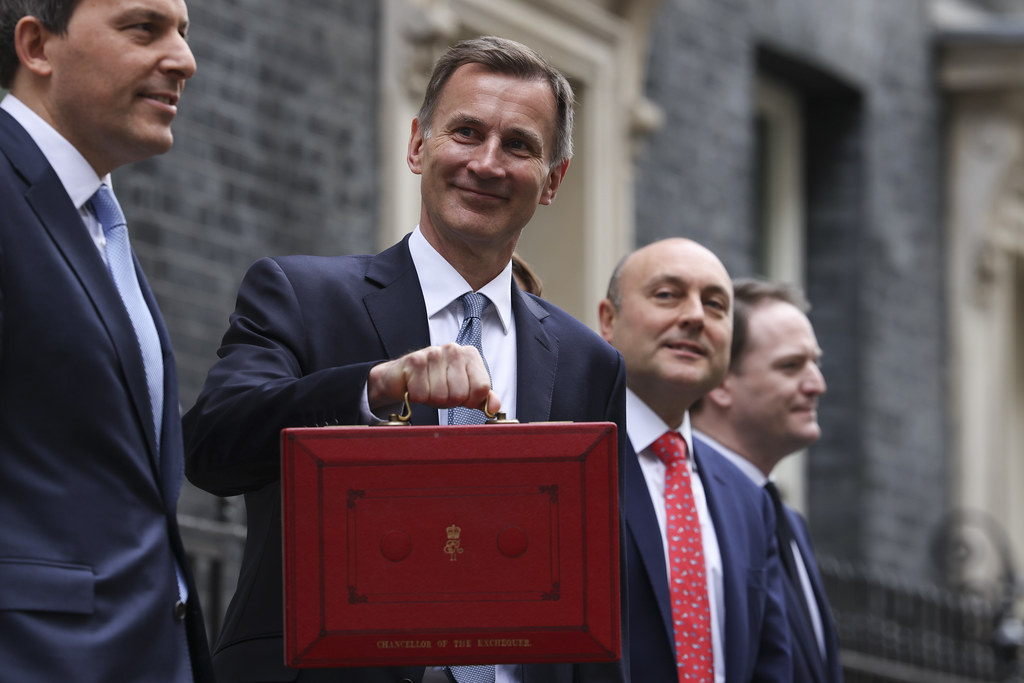Spring Budget 2024 proposals
PolicyEngine estimates reported likely tax-benefit reforms ahead of the UK Spring Budget.

Contents
Budget reform options
Distributional impacts
National Insurance contributions, 2p decrease
National Insurance contributions, 1p decrease
Basic Rate decrease
Conclusion
On Wednesday, 6th March, Chancellor of the Exchequer Jeremy Hunt will present the government's 2024 Spring Budget. Ahead of the announcement, media reports speculate that the Chancellor is considering cutting the main National Insurance rate, in an extension to his previous cuts in the Autumn Statement 2023 (analysed by PolicyEngine in
In this post, we'll estimate the impacts of such a cut upon the budget, as well as upon society-wide economic outcomes. We'll also look at the impact these changes would have upon individual UK households.
Budget reform options#
Separate media sources identify four potential reforms that the Chancellor is considering:
- Cuts to Employee (Class 1) National Insurance Contributions (NICs) by either 1p
1 or 2p2 - A 2p cut to the basic rate of tax, lowering the rate from 20p to 18p
3
PolicyEngine's top-level economic impact estimates follow below. In modelling these reforms, we assume each took effect on 1 January 2024 and will evaluate their impacts over calendar year 2024.
Table 1: Potential budget reforms and their impacts
Distributional impacts#
Figure 1: Each provision's change in net income, by decile
Change in net income by decile
This figure divides the UK into ten income groups, called 'deciles', of equal population. Decile '1' corresponds to the lowest-income Britons, and '10' corresponds to the highest. It then shows the change in post-tax income for the average member of each decile, under each possible reform.
National Insurance contributions, 2p decrease#
Under this policy, the government would reduce required contributions to the National Insurance system (Class 1 contributions) for individuals employed by an employer. The current rate of 10p, brought into force on 6 January 2024, would be further lowered to 8p.
The PolicyEngine model projects that a reduction in the Class 1 NIC contribution rate by 2p costs the government approximately £10.0 billion. Under this cut, every income decile gains in aggregate, with 63.8% of households increasing their post-tax income, and none seeing a decrease in disposable. This reform would increase inequality, as measured by the Gini coefficient, by 0.3%, while reducing the poverty rate by 0.2%.
For a married couple with two children making £35,000 a year, this reform would lower National Insurance payments by £214 for 2024. However, their maximum possible Universal Credit benefit also falls by £118, providing a net benefit of £96 for the year.
National Insurance contributions, 1p decrease#
Similar to the 2p National Insurance rate cut, under this reform, the government would reduce Class 1 National Insurance contributions by 1p, from the current rate of 10p to 9p.
PolicyEngine projects that this cut would cost the government £5.0 billion. Similar to the 2p cut, under this reform, post-tax income increases for every income decile, with the same 63.8% of households gaining disposable income. This reform would slightly increase the Gini coefficient, by 0.2%, while having a negiligible impact upon the poverty rate.
For the same hypothetical couple from above, this reform would lower National Insurance payments by £115 for the year. However, this family's maximum Universal Credit benefit would fall by a corresponding £63, providing an overall benefit of £52 for 2024.
Basic Rate decrease#
Under another speculated reform, the government would lower the Basic Rate, the tax rate of the UK's lowest tax bracket, by 2p, from its current 20p to 18p.
As the Basic Rate taxes a larger pool of household income sources than the National Insurance system, PolicyEngine estimates the cost of this reform to be £11.1 billion for 2024. This policy would increase the net income of 69.6% of UK households, with every individual decile also experiencing an increase in net income. Households in higher deciles do particularly well under this reform; households in the UK's top decile would receive £1,175 in extra net income in 2024, while households in the country's lowest decile would receive £16. This policy would lower the poverty rate by 0.4% relative to its current value. However, it would raise the Gini coefficient by 0.3%.
For a two-child household earning £35,000 gross income in 2024, this reform would lower income tax by £197. However, this family's maximum Universal Credit benefit would also decrease by £108, generating a net increase in post-tax income of £89.
Conclusion#
In anticipation of the Chancellor's Spring Budget 2024, PolicyEngine has modelled the impacts of three speculative tax reforms: two different rate cuts to Class 1 National Insurance contributions and a 2p decrease in the Basic Rate. PolicyEngine estimates the cost of a 2p Basic Rate cut to be £11.1 billion, while a 2p decrease to National Insurance contributions would be slightly less, at £10.0 billion, and a 1p National Insurance contribution decrease would be half of that, at £5.0 billion.
All three policies would raise the net income of two-thirds of Britons, especially those in higher-income households, though a 2p cut to the Basic Rate would be slightly broader than the other two reforms, benefitting 69.8% of households. All three policies would exhibit small, ambiguous effects on income inequality, as well as slight reductions to the poverty rate.
Finally, in a sample household composed of a married couple with two children under age 18 and a pre-tax income of £35,000, PolicyEngine would project the 2p cuts to the Basic Rate and National Insurance contributions to lower the household's tax payments by roughly £200, with a 1p National Insurance cut saving the household £115. However, these savings would correspond with a lower maximum Universal Credit for the household in each case.
For more information about how these possible tax reform provisions might affect one's household or community, we invite our readers to use one of the three personalised calculators in Table 1 above, as well as to follow us on any of the social media platforms linked at the bottom of this page.

anthony volk
Full-Stack Engineer at PolicyEngine

nikhil woodruff
PolicyEngine's Co-founder and CTO

Subscribe to PolicyEngine
Get the latests posts delivered right to your inbox.
PolicyEngine is a registered charity with the Charity Commission of England and Wales (no. 1210532) and as a private company limited by guarantee with Companies House (no. 15023806).
© 2025 PolicyEngine. All rights reserved.